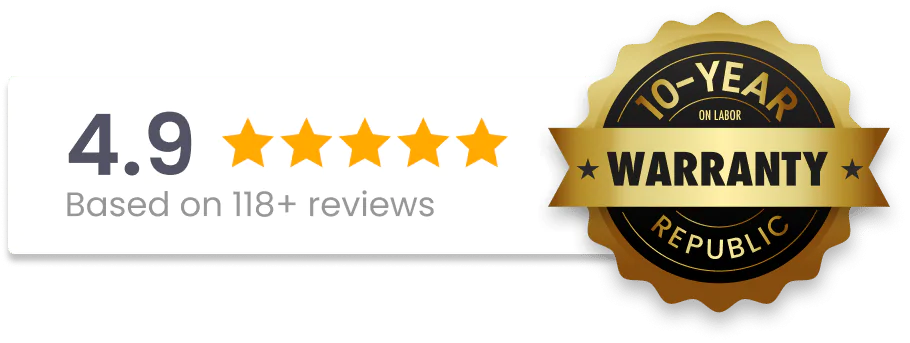Did you realize that Florida gets hit by an average of thunderstorms for 1,235 per year? This is the highest anywhere in the United States. In such extreme climatic conditions, homeowners in Florida need to protect their property by taking the necessary measures.
One of the ways of protecting your home from Florida storm effects is by having impact resistant windows set up. Let’s examine how these windows can help you and if it’s mandatory to have them.
- The legal side of having impact windows
- Florida’s Building Code explained
- Importance and benefits of impact windows
Legal Implications of Not Having Impact Windows – Mandatory or Not?
While having impact windows offers significant benefits, the absence of these windows can have serious legal implications for homeowners in Florida.
Impact windows are not just a luxury but a necessity in Florida, a state prone to hurricanes and severe weather conditions.
The installation of impact windows is mandated by the Florida Building Code to ensure the safety and protection of homes and their occupants. Failure to comply with these regulations can result in severe consequences for homeowners.
Potential Fines and Penalties
Florida’s building codes are strictly enforced, and failure to comply can result in fines and penalties. Homeowners who fail to install impact windows or obtain the necessary permits may face substantial fines and be required to rectify the situation within a specified period of time.
Additionally, non-compliance with building codes can lead to legal action by local authorities, further escalating the financial burden on homeowners. It is crucial for homeowners to understand the legal requirements regarding impact windows to avoid costly fines and penalties.
Impact on Homeowner’s Insurance
Insurance companies in Florida recognize the value of impact windows in protecting homes against severe weather events. As a result, many insurance providers offer discounts for homes with impact windows.
On the other hand, not having impact windows may result in higher insurance premiums or even the denial of coverage altogether.
Homeowners without impact windows may find themselves at a higher risk of property damage during hurricanes and tropical storms, leading insurance companies to view them as a greater liability.
It is essential for homeowners to consider the long-term financial implications of not having impact windows, both in terms of potential insurance costs and the safety of their property.
The Importance of Impact Windows in the Sunshine State
Living in Florida, where hurricanes are a common occurrence during certain parts of the year, the importance of impact windows cannot be overstated. These specially designed windows play a crucial role in protecting homes from the destructive forces of hurricanes and tropical storms, offering a sense of security and peace of mind to residents.
Protection Against Hurricanes
Living in Florida means facing hurricanes regularly. Impact windows are specifically designed to protect homes from the destructive forces of these storms. They offer a sense of security and peace of mind, knowing that your home is safeguarded against extreme weather conditions.
Enhanced Safety Compared to Regular Windows
Ordinary windows are not made strong enough to resist the large amounts of air that come with a hurricane. When there is a hurricane, strong winds can make flying objects a real threat. Normal windows, which can easily break from the impact, can then leave houses open to the damaging effects of the wind and water.
On the other hand, an impact-resistant window consists of multiple layers of strong materials, which are designed in a way that they can absorb the impact from flying debris, and therefore protect the building from damage.
Noise Reduction
Whether there’s already an impact window to grant noise reduction or not, at least they will create an environment where people can hear themselves speaking out loud, as well as being more comfortable. This can be particularly beneficial in noisy neighborhoods or areas with high traffic.
UV Protection
These windows filter harmful UV rays, protecting your home’s interior from sun damage. This can help preserve your furniture, flooring, and other belongings from fading and deterioration caused by prolonged sun exposure.
Improved Energy Efficiency
Impact windows improve energy efficiency by reducing heat transfer. This helps regulate the temperature inside your home, reducing the workload on your heating and cooling systems. As a result, you can enjoy lower utility bills and a more environmentally friendly home.
Added Security
The sturdy construction of impact windows makes them more difficult to break, providing an added layer of security against intruders. This can enhance the overall safety of your home, giving you greater peace of mind.
Cost Savings
The use of long-lasting impact windows could over time result in saving energy consumption costs. Since they minimize heat transfer from the glass to the interior, the windows are therefore responsible of creating a consistent temperature throughout your home, thus minimizing energy consumption and hence the bill costs.
The result in the windows is noticeable, that is heat transfer is greatly reduced, thus they will help you to maintain a constant indoor temperature and in this way, you’ll reduce energy consumption and therefore, your bills will be lower.
Although not every house in Florida is obliged to be equipped with impact windows, their multiple advantages qualify them as a good investment. Impact windows, apart from being the ideal solution to hurricanes, can also bring about improvements of energy efficiency and security for folks living in this storm-prone state.
Impact Windows vs. Regular Windows
Many abode owners might have a query about how it is possible for the usual windows to guard them from hurricanes. The sad truth is that conventional windows do not seem to be in a position to defy the substantial forces caused by hurricane winds which make them get blown away easily.
In other words, impact windows are created with the idea of safe mechanical operation for this kind of condition. It is the main characteristic of impact windows that makes it the most appropriate type for the house and the family to be protected from possible damage.
When a hurricane happens there are the following:
- strong winds
- debris
- loose city objects, e.g., beer cans
These are the first things women begin to see spinning around, which are then converted into dangerous projectiles.
Standard windows that jet on hitting lead to the easy access of the houses by the wind and rain that causes more destruction. It’s also worth noting that the construction of impact windows is based on incorporating several strong layers that are expected to blow up flying debris without tearing the rest of the structure of the house.
Florida’s Building Codes
Florida has some of the strictest building codes in the country and for a good reason. The state is highly susceptible to hurricanes and other severe weather events. These building codes have been put in place to ensure the safety and resilience of structures against the forces of nature. Impact windows play a vital role in meeting these building code requirements.
The Role of Impact Windows in Building Codes
In order to meet the Florida building codes, homes must have windows that can withstand hurricane-force winds and impact from flying debris. Impact windows, also known as hurricane windows, are specifically designed to withstand these extreme conditions.
These windows are made of multiple layers of shatter-resistant glass, reinforced with a layer of durable plastic.
Furthermore, impact windows are required to undergo rigorous testing to ensure their ability to withstand impact and wind pressure. They are tested by simulating the force of hurricane winds and the impact of large objects, such as tree branches or projectiles propelled by strong winds. Only windows that pass these tests are approved for use in Florida.
Changes in Building Codes Over the Years
The Florida building codes have always been in line with the latest technologies and research. The increasing awareness of the hurricane risks and the necessity for building a more resilient building stand as the main reasons.
Thus, the impact windows have become an inescapable part of the new developments and reconstructions carried out in the state. Some of the changes are the following:
- High-rise buildings will need to install impact windows which will be a major change in the building codes.
- The tallest buildings were allowed to get around some of the hurricane protective rules since they were so high up.
- In the wake of the unforgiving consequences of Hurricane Andrew in 1992, which incredibly inflicted high-rise buildings destroyed by the force of nature, the building codes were revised to adopt the high-rise structures.
- Introduction of impact-resistant doors as a requirement in building codes. These doors are designed to withstand the same extreme conditions as impact windows and provide an additional layer of protection for homes and buildings.
- The overall structural integrity of a building is further enhanced, reducing the risk of damage during a hurricane or severe weather event.
The Process of Installing Impact Windows
Now that we understand the importance of impact windows and the legal implications of not having them, let’s delve into the process of installing these windows.
Choosing the Right Impact Windows for Your Home
Before embarking on the installation process, it’s essential to select the right impact windows for your home. Consider factors such as:
- design
- performance ratings
- budget
Consulting with a professional window installer can help you make an informed decision that meets your needs and ensures compliance with building codes.
When choosing impact windows, it’s crucial to consider the different types of impact-resistant glass available. Some examples are:
- Laminated glass, for example, consists of a layer of polyvinyl butyral (PVB) between two or more panes of glass, providing strength and durability.
- Tempered glass, which is heat-treated to increase its strength and shatter resistance. Understanding the benefits of each type can help you make the right choice for your home’s specific needs.
Understanding the Installation Process
The installation of impact windows involves several steps.
- First, the existing windows are removed, and the window openings are prepared.
- The impact windows are then carefully installed, ensuring a proper fit and seal to provide maximum protection against severe weather.
- Finally, the windows are inspected to ensure they meet the necessary building code requirements.
During the installation process, it’s important to consider the impact on windows’ energy efficiency. Proper installation techniques can help improve your home’s energy efficiency and reduce heating and cooling costs, out of which the most popular ones are:
- Using insulated frames
- Using low-emissivity coatings
Additionally, ensuring a tight seal during installation can prevent air leakage and water infiltration, further enhancing the windows’ performance.
Secure Your Home with Impact Windows: A Must-Have for Florida Homeowners
In Florida, extreme weather being a constant threat, it is a matter of high priority to protect homes from the destruction it can cause by impact windows. They are engineered to safeguard houses against cyclones, increase the security of the house, cut off the noise, and save energy.
Even though it is not a citywide requirement for all houses, the advantages of impact windows in Florida make them a feasible option and the most popular form of investment.






